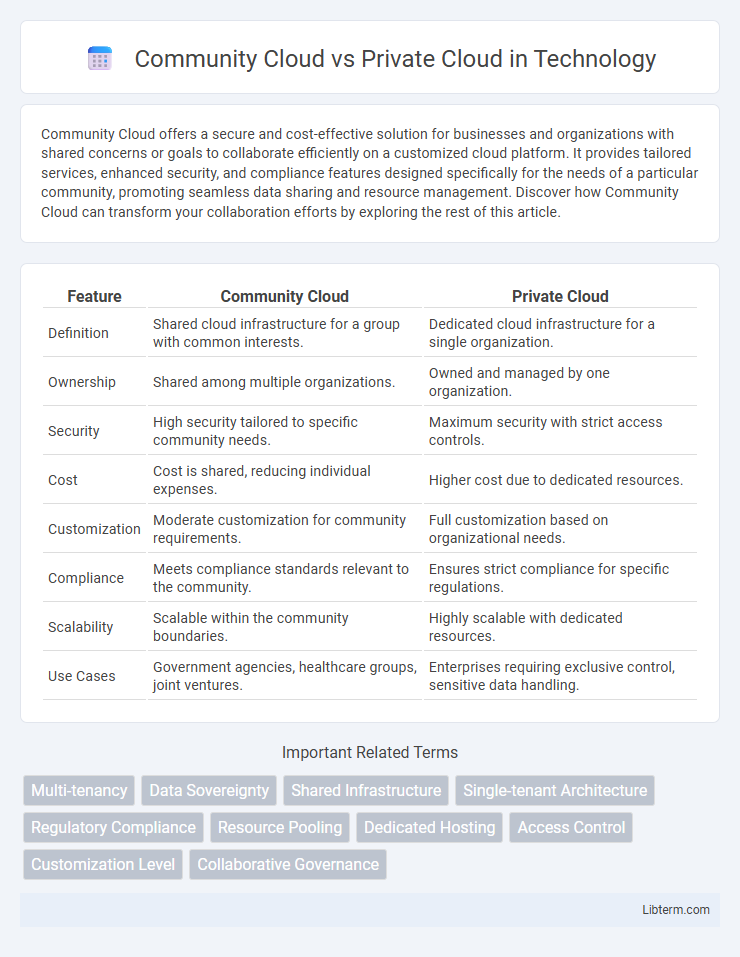Community Cloud offers a secure and cost-effective solution for businesses and organizations with shared concerns or goals to collaborate efficiently on a customized cloud platform. It provides tailored services, enhanced security, and compliance features designed specifically for the needs of a particular community, promoting seamless data sharing and resource management. Discover how Community Cloud can transform your collaboration efforts by exploring the rest of this article.
Table of Comparison
| Feature | Community Cloud | Private Cloud |
|---|---|---|
| Definition | Shared cloud infrastructure for a group with common interests. | Dedicated cloud infrastructure for a single organization. |
| Ownership | Shared among multiple organizations. | Owned and managed by one organization. |
| Security | High security tailored to specific community needs. | Maximum security with strict access controls. |
| Cost | Cost is shared, reducing individual expenses. | Higher cost due to dedicated resources. |
| Customization | Moderate customization for community requirements. | Full customization based on organizational needs. |
| Compliance | Meets compliance standards relevant to the community. | Ensures strict compliance for specific regulations. |
| Scalability | Scalable within the community boundaries. | Highly scalable with dedicated resources. |
| Use Cases | Government agencies, healthcare groups, joint ventures. | Enterprises requiring exclusive control, sensitive data handling. |
Introduction to Community Cloud and Private Cloud
Community Cloud is a cloud deployment model shared by multiple organizations with common concerns such as security, compliance, or jurisdiction, providing a collaborative environment with controlled access and resource pooling. Private Cloud offers dedicated infrastructure exclusively for a single organization, enabling greater control, customization, and enhanced security tailored to specific business needs. Both models address unique operational requirements, with Community Cloud fostering shared governance and Private Cloud delivering isolated management.
Key Characteristics of Community Cloud
Community Cloud offers a shared infrastructure specifically designed for organizations with common concerns such as security, compliance, or jurisdiction. It provides collaborative resources and policies tailored to meet the unique needs of the participating entities while ensuring data privacy and control within the community. Cost-sharing among members reduces expenses compared to private clouds, though it maintains higher levels of customization and access control than public clouds.
Key Features of Private Cloud
Private Cloud offers dedicated infrastructure exclusively accessible to a single organization, ensuring enhanced security, control, and customization tailored to specific business needs. Key features include on-premises or hosted environments, advanced access controls, and compliance with strict regulatory requirements, enabling organizations to manage workloads with greater privacy and reliability. Scalability and integration with existing IT infrastructure further empower enterprises to optimize resource allocation and maintain operational consistency.
Differences in Ownership and Control
Community Cloud is jointly owned and managed by multiple organizations sharing similar security, compliance, and policy requirements, allowing collaborative control and resource sharing. Private Cloud is owned and operated by a single organization, providing exclusive control over infrastructure, security, and data governance. This distinction in ownership and control directly impacts customization, compliance adherence, and access management within each cloud model.
Security and Compliance Comparison
Community Cloud offers shared infrastructure designed for organizations with common security and compliance requirements, providing tailored controls that meet industry-specific standards such as HIPAA or GDPR. Private Cloud delivers exclusive resources dedicated to a single organization, enabling higher customization of security policies and compliance management to address unique internal governance and regulatory needs. Security in Community Cloud benefits from collaborative risk mitigation, while Private Cloud provides enhanced isolation and control, crucial for sensitive data environments requiring stringent compliance adherence.
Cost Implications: Community vs Private Cloud
Community cloud typically reduces costs by sharing infrastructure expenses among multiple organizations with similar security and compliance requirements, offering a more affordable option compared to private cloud deployments. Private cloud demands higher capital investment due to dedicated hardware, maintenance, and management resources exclusively allocated to a single organization. Organizations must consider total cost of ownership (TCO), including operational and scaling expenses, which generally remain lower in community cloud environments due to resource pooling.
Use Cases for Community Cloud
Community Cloud is ideal for organizations with shared concerns such as regulatory compliance, security requirements, or mission objectives, including government agencies, healthcare institutions, and financial services firms. The shared infrastructure supports collaborative projects, data exchange, and joint research efforts while maintaining strict access controls tailored to the community's needs. Use cases frequently involve sensitive data handling, compliance with industry-specific standards like HIPAA or GDPR, and enhanced cost-efficiency through resource pooling among similar organizations.
Use Cases for Private Cloud
Private Cloud is ideal for organizations requiring enhanced security and compliance, such as financial institutions and healthcare providers managing sensitive data. Enterprises with predictable workloads benefit from dedicated resources and customizable infrastructure in Private Cloud environments, ensuring high performance and control. Use cases also include large corporations that need to meet regulatory requirements while maintaining data sovereignty and operational efficiency.
Scalability and Flexibility Analysis
Private Cloud offers high scalability tailored to a single organization's specific needs, enabling customized resource allocation and enhanced security controls. Community Cloud provides moderate scalability shared among organizations with common goals, balancing cost efficiency with collaborative flexibility but potentially limiting rapid resource expansion. Flexibility in Private Cloud allows extensive customization and control, whereas Community Cloud flexibility depends on the collective requirements and governance of involved members.
Choosing the Right Cloud Model for Your Organization
Choosing the right cloud model depends on your organization's specific needs for security, compliance, and collaboration. Community Cloud offers a shared infrastructure tailored for organizations with similar regulatory requirements, promoting cost efficiency and joint management. Private Cloud provides dedicated resources and enhanced control, ideal for businesses requiring stringent data privacy and customization.
Community Cloud Infographic

 libterm.com
libterm.com